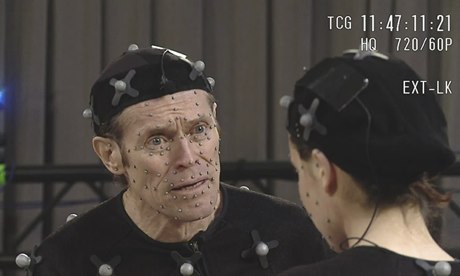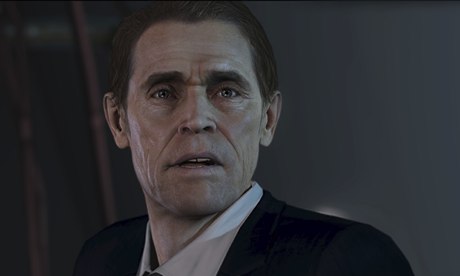
"By its very nature, there cannot be a plot in a game," George Lucas said a few weeks ago. It is a curious claim from the man who, in 1982, founded LucasArts, a video games company lauded for its story driven titles.
Some of Hollywood's finest disagree, increasingly attracted to games for the storytelling and acting opportunities. Beyond: Two Souls, written and directed by auteur creator David Cage, and starring Ellen Page and Willem Dafoe, is released this week on PlayStation 3.
While actors have lent their voices to games before – Liam Neeson appearing in Fallout 3, or Samuel L Jackson in Grand Theft Auto: San Andreas, for instance – this is one of the first times a fully acted performance has been captured, using technology similar to Andy Serkis's turn as Gollum in The Lord of the Rings.
Dafoe and Page, who starred in Juno, were both attracted to the project by its narrative drive and the opportunities presented by telling that story through performance capture. "I was sent the material, it was awesome, the female protagonist was incredible – I mean, what a great opportunity for an actor," says Page. "Really it was when I sat down with David and heard his intent, and about my character's journey and struggle and story, and knowing I'd get to work with Willem – to be honest, it was a bit of a no-brainer."
Cage has spent his career telling stories through games. After debuting in 1999 with sci-fi effort The Nomad Soul, by the time of Heavy Rain in 2010 – a murder thriller mixed with child kidnapping – Cage was using gaming narrative to explore such intricate material as his own fears and doubts about becoming a father.Beyond sees Cage returning to more speculative fare. The story spans 15 years in the life of Jodie Holmes (Page), who is haunted by a mysterious entity known as Aiden. While the presence seems to grant her unusual powers, it also leads to Jodie being abandoned by her parents and subjected to a battery of military experiments. Nathan Dawkins (Dafoe), the man analysing her abilities, becomes Jodie's only constant, creating a conflicted father-daughter relationship.
 Willem Dafoe as Nathan Dawkins.
Willem Dafoe as Nathan Dawkins. It was this aspect that appealed most to Dafoe. "I liked the relationship; it has a complexity to it," he says. "I knew it would be interesting to do, [with] an ambiguity to it that I knew we'd find in the doing. There was nothing cartoony or stereotypical or familiar about it, and I thought, 'Cool, that's something I'd like to work on'."
Page also found sympathy in the role of Jodie: "I think what's so great about Jodie is she's so real and complex. Of course, she's strong and she's smart and all of those things, but she's also had incredible difficulty and sadness and anger. [She] oftentimes goes to very, very dark places, and has this wholeness, this realness. I only hope that what I brought to the table shows that. One can only hope that as an actor, what you felt about the role and what made it so interesting to you, that what you do will hopefully make the player feel that too."
While Cage's games are sometimes criticised for being too cinematic, the ability to place audiences directly into the story makes them his preferred outlet.
"When you watch a film you can only be passive; you can't change what is going on the screen," he says. "Games are the only medium where the audience can participate in the making. You can become the actor, the director, the writer of the experience – only games allow you to do this. This is why it's such a fascinating medium."
Crafting a story in games does, however, demand different considerations. The inherent level of interactivity changes how a plot progresses and trying to predict what choices players will make means writing scenarios and dialogue to account for numerous outcomes. Yet in scripting Beyond, Cage wanted to avoid some of the immersion-shattering consequences gamers sometimes experience. "When you fail in an action sequence, the game doesn't stop. There is no 'game over' situation. It takes account of this failure and moves to a different part of the story."
For the actors involved, this also means getting deeper into their roles. "Performing when you have to create four or five variations of a scene is a very difficult challenge but an exciting one," says Page. "I would respond, take a beat, give the other response, take a beat, another response. It's difficult just for the basicness of memorising the dialogue and having to constantly emotionally pivot. No matter what the emotional complexity of a scene is, you're doing multiple versions, and that is like some sort of sadistic acting boot camp!"
Many games and films employ some level of motion capture, decking people out in not-so-stylish bodysuits covered in easily trackable marker balls, allowing their movements later to be animated or mapped into digital environments.
Beyond takes the technology a step further, with a custom rig of approximately 70 cameras recording Page and Dafoe's full performances from every angle, rather than layering separately recorded voice sessions over independently animated scenes. Cage was then able to freely position the virtual, in-game camera to present the most dramatic shot.
The innovative approach proved to be a profoundly different experience from being on either a stage or a film set. "It was difficult at first because it's new, because you don't have sets, you don't have wardrobe," says Page. "It was just a totally foreign experience to me. But then, by day two, it's all over – all of those things that have felt like constraints turn into freedom. It's just you, you're interacting with the other actor you're working with or by yourself, and you really have nothing. It's a purer form of acting, in a way."
Dafoe, whose background includes extensive theatre work with technologically innovative troupes – the Performance Group and the Wooster Group – is no stranger to mo-cap.
"When I shot Disney's John Carter, you knew where the camera was and there were camera angles and elaborate setups and lighting," he recalls. "[On Beyond], the space we were performing in was featureless – occasionally you'd have a chair or a prop – but you had to rely on your imagination. It was like essential acting. There were very few distractions. After a little while you're just concentrating on the acting, which is liberating and fun."
Asked about Lucas's comments and the storytelling deficiencies he sees in games, Page has a diplomatic response. "I would be interested in him playing Beyond, because I think [plot is] exactly what David's doing. I was just blown away by the journey Jodie goes on, which is just incredibly complex and emotional and subversive. I'm very excited to see how people respond to that."
Dafoe, with a raucous laugh, says "George is full of shit!", adding: "He's making a case for something that's written, something constructed, and that that's the only way you can tell a story. But I don't think you can control stories. One story, people are going to read it different ways. "
This seems to be Lucas's great observational omission: whether it is players taking direct control of a creator's narrative or cinemagoers leaving with their own insights and readings of a film, stories have always been interactive.


Sign up for the Guardian Today
Our editors' picks for the day's top news and commentary delivered to your inbox each morning.
Sign up for the daily email
Source: Tablet Android
0 komentar "Beyond gaming with Willem Dafoe and Elllen Page", Baca atau Masukkan Komentar
Posting Komentar